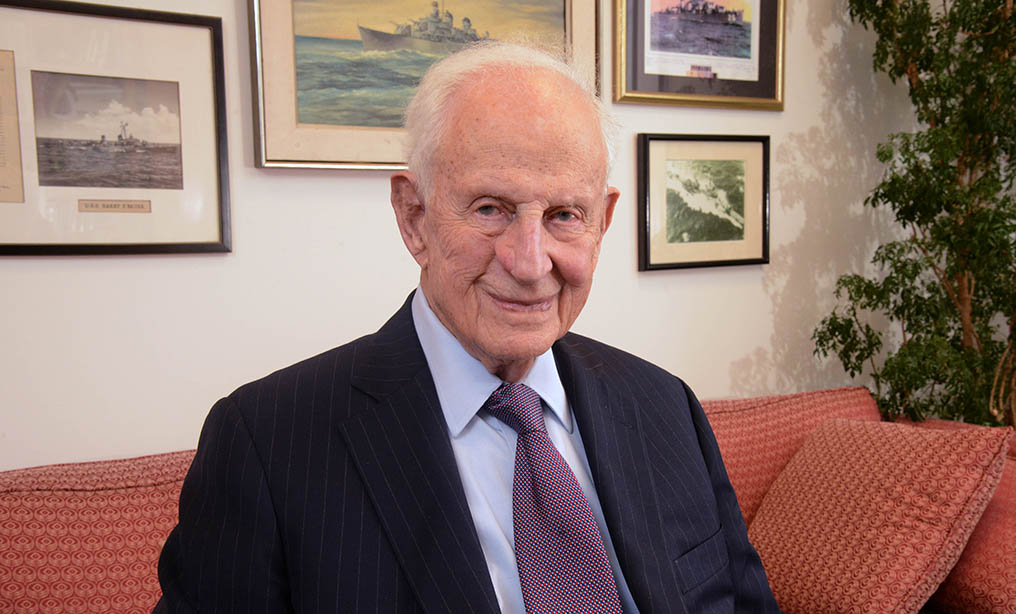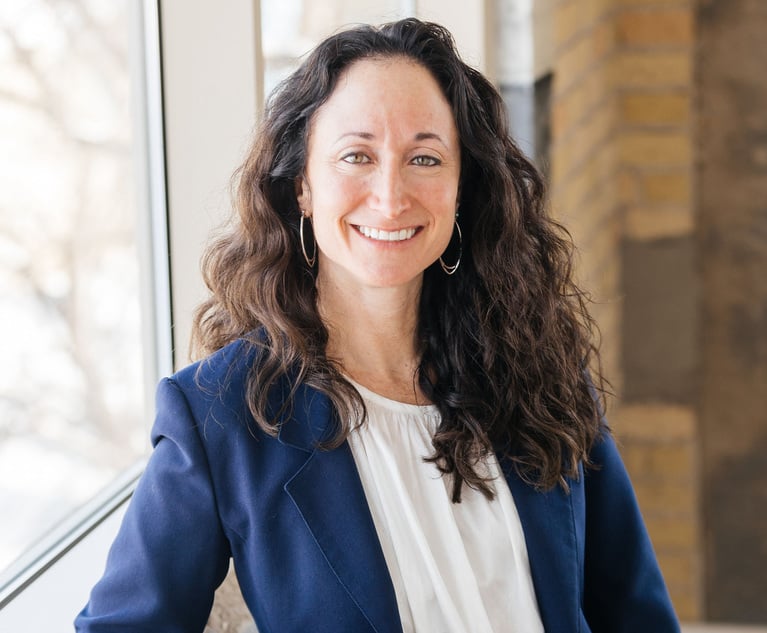A Visionary and a Great Soul: Remembering Morgenthau
He took on cases that were novel if they were important and he believed in them, even if there was a risk they would be lost. He was a great man, and a good man. He inspired us and so many others to do great things. We will miss him.
July 23, 2019 at 10:00 AM
5 minute read
 Robert Morgenthau in his office at Wachtell, Lipton, Rosen & Katz in 2013. Photo: Rick Kopstein
Robert Morgenthau in his office at Wachtell, Lipton, Rosen & Katz in 2013. Photo: Rick Kopstein
For generations of prosecutors, Robert Morgenthau was “The Boss.” The three of us served as heads of the District Attorney's international bureau, known informally as DANY Overseas. Even after he retired 10 years ago, he remained a strong presence in our lives, calling to discuss his latest cause—assisting immigrants, getting someone off death row or helping support his kids at the Police Athletic League or fighting anti-Semitism and neo-Nazi activity as chair of the Museum of Jewish Heritage. He had slowed down a bit; his hearing wasn't great; but his mind was sharp; his passion for justice was great; and he well remembered who had stood up and who had not, over many decades. We and the thousands of others who had learned their craft and their ethics from the Boss were certain we would be celebrating his centenary and can hardly believe he is gone, mere days before his 100th birthday.
He knew everyone, but no one ever got a break on a case that they did not deserve on the merits. Mr. Morgenthau kept everyone honest. He believed and repeated that “you cannot prosecute crime in the streets without prosecuting crime in the suites.” In a democracy, he believed, that is critical.
When the international bureau was started, we were the first and no one could understand how or why a local prosecutor was prosecuting the largest international frauds in the world. He knew what Manhattan's financial markets meant to the world—more than knew it, he intuited it. He would always say that we were the local beat cop for global financial markets. When federal prosecutors failed to be sufficiently aggressive against the big banks or foreign leaders whom the State Department did not want to be the subject of legal scrutiny, Mr. Morgenthau kept everyone honest.
The obituaries have been many, but we wanted to share our personal memories of the Boss and his influence on our careers and our characters. Running DANY Overseas was probably the highpoint of our professional careers. It was a bureau that Mr. Morgenthau created, and the bureau chief effectively reported directly to him. He'd call one of us and ask if we had any time to spare to come see him. As if he was intruding on our time. He would have read something in the papers about finance or international business that troubled him, and he'd call us in to brainstorm. “What can we do about this?” he would ask.
In the early 1990s we were referred a case by Sen. John Kerry's counsel involving the Bank of Credit & Commerce International—BCCI. The Bank, supposedly a $23 billion institution with offices in 80 countries, had exceedingly cozy relations with members of government around the globe, who were able to quash investigations when anyone started to look at it seriously. Foreign governments complained about the investigation but Morgenthau was willing to go where the evidence led. For him it was the only way to go. The bank was revealed as a Ponzi scheme and a factory for laundering money. It was shut down.
Later on, we were chasing dirty money from South America to the Middle East, and Mr. Morgenthau was increasingly focused on Hezbollah activities in South America and Iran's ability to evade sanctions. We started working with foreign prosecutors and intelligence services who would give us detailed information simply on the strength of the Boss's name and reputation. We would show up to work on Monday and the Boss would tell us we were flying to Israel the next day. Or Paraguay. Or Brazil. In an office where business travel usually meant a subway ride to Washington Heights, this was exciting stuff.
Thanks to his focus and determination, we got into some important international cases: the Alavi Foundation, WMD proliferation, indicting the Iranian shipping line, and finally cases where banks were stripping transaction information showing Iranian involvement. One of the last big cases of his career was the settlement with Credit Suisse late in 2009. Credit Suisse had been trying to delay the case until after the Boss left. Our team worked around the clock and two weeks before Mr. Morgenthau's retirement, we reached a significant settlement. We sat down in front of his desk and waited for some words of praise, job well done, perhaps some reminiscing. He raised an eyebrow and asked if we could get any more cases done before the end of the year.
He believed that justice knew no race, creed, color or income bracket. He took on cases that were novel if they were important and he believed in them, even if there was a risk they would be lost. He was a great man, and a good man. He inspired us and so many others to do great things. We will miss him.
Adam Kaufmann, Art Middlemiss and John Moscow work together at Lewis Baach Kaufmann Middlemiss, a law firm in New York City and Washington, D.C.
This content has been archived. It is available through our partners, LexisNexis® and Bloomberg Law.
To view this content, please continue to their sites.
Not a Lexis Subscriber?
Subscribe Now
Not a Bloomberg Law Subscriber?
Subscribe Now
NOT FOR REPRINT
© 2025 ALM Global, LLC, All Rights Reserved. Request academic re-use from www.copyright.com. All other uses, submit a request to [email protected]. For more information visit Asset & Logo Licensing.
You Might Like
View All
‘Catholic Charities v. Wisconsin Labor and Industry Review Commission’: Another Consequence of 'Hobby Lobby'?
8 minute read
AI and Social Media Fakes: Are You Protecting Your Brand?

Neighboring States Have Either Passed or Proposed Climate Superfund Laws—Is Pennsylvania Next?
7 minute read
Trending Stories
- 1New York-Based Skadden Team Joins White & Case Group in Mexico City for Citigroup Demerger
- 2No Two Wildfires Alike: Lawyers Take Different Legal Strategies in California
- 3Poop-Themed Dog Toy OK as Parody, but Still Tarnished Jack Daniel’s Brand, Court Says
- 4Meet the New President of NY's Association of Trial Court Jurists
- 5Lawyers' Phones Are Ringing: What Should Employers Do If ICE Raids Their Business?
Who Got The Work
J. Brugh Lower of Gibbons has entered an appearance for industrial equipment supplier Devco Corporation in a pending trademark infringement lawsuit. The suit, accusing the defendant of selling knock-off Graco products, was filed Dec. 18 in New Jersey District Court by Rivkin Radler on behalf of Graco Inc. and Graco Minnesota. The case, assigned to U.S. District Judge Zahid N. Quraishi, is 3:24-cv-11294, Graco Inc. et al v. Devco Corporation.
Who Got The Work
Rebecca Maller-Stein and Kent A. Yalowitz of Arnold & Porter Kaye Scholer have entered their appearances for Hanaco Venture Capital and its executives, Lior Prosor and David Frankel, in a pending securities lawsuit. The action, filed on Dec. 24 in New York Southern District Court by Zell, Aron & Co. on behalf of Goldeneye Advisors, accuses the defendants of negligently and fraudulently managing the plaintiff's $1 million investment. The case, assigned to U.S. District Judge Vernon S. Broderick, is 1:24-cv-09918, Goldeneye Advisors, LLC v. Hanaco Venture Capital, Ltd. et al.
Who Got The Work
Attorneys from A&O Shearman has stepped in as defense counsel for Toronto-Dominion Bank and other defendants in a pending securities class action. The suit, filed Dec. 11 in New York Southern District Court by Bleichmar Fonti & Auld, accuses the defendants of concealing the bank's 'pervasive' deficiencies in regards to its compliance with the Bank Secrecy Act and the quality of its anti-money laundering controls. The case, assigned to U.S. District Judge Arun Subramanian, is 1:24-cv-09445, Gonzalez v. The Toronto-Dominion Bank et al.
Who Got The Work
Crown Castle International, a Pennsylvania company providing shared communications infrastructure, has turned to Luke D. Wolf of Gordon Rees Scully Mansukhani to fend off a pending breach-of-contract lawsuit. The court action, filed Nov. 25 in Michigan Eastern District Court by Hooper Hathaway PC on behalf of The Town Residences LLC, accuses Crown Castle of failing to transfer approximately $30,000 in utility payments from T-Mobile in breach of a roof-top lease and assignment agreement. The case, assigned to U.S. District Judge Susan K. Declercq, is 2:24-cv-13131, The Town Residences LLC v. T-Mobile US, Inc. et al.
Who Got The Work
Wilfred P. Coronato and Daniel M. Schwartz of McCarter & English have stepped in as defense counsel to Electrolux Home Products Inc. in a pending product liability lawsuit. The court action, filed Nov. 26 in New York Eastern District Court by Poulos Lopiccolo PC and Nagel Rice LLP on behalf of David Stern, alleges that the defendant's refrigerators’ drawers and shelving repeatedly break and fall apart within months after purchase. The case, assigned to U.S. District Judge Joan M. Azrack, is 2:24-cv-08204, Stern v. Electrolux Home Products, Inc.
Featured Firms
Law Offices of Gary Martin Hays & Associates, P.C.
(470) 294-1674
Law Offices of Mark E. Salomone
(857) 444-6468
Smith & Hassler
(713) 739-1250






